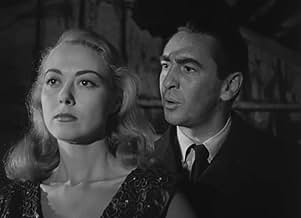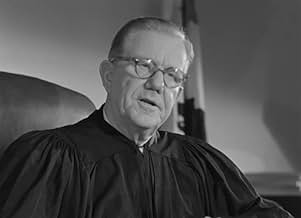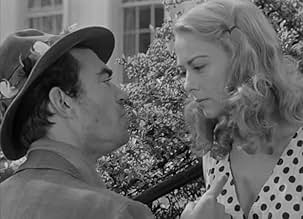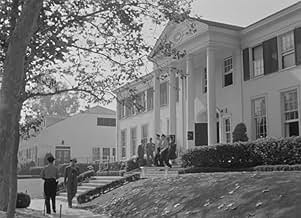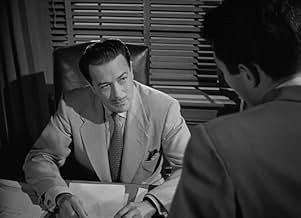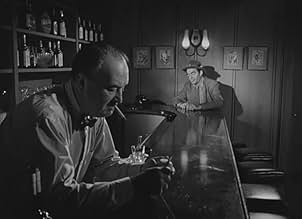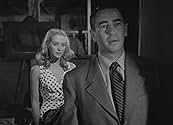AVALIAÇÃO DA IMDb
6,2/10
925
SUA AVALIAÇÃO
Adicionar um enredo no seu idiomaLawyer defends migrant worker falsely accused of two murders.Lawyer defends migrant worker falsely accused of two murders.Lawyer defends migrant worker falsely accused of two murders.
- Direção
- Roteiristas
- Artistas
Frank Baker
- Court Stenographer
- (não creditado)
Marshall Bradford
- Coroner
- (não creditado)
Ralph Brooks
- Courtroom Photographer
- (não creditado)
Benny Burt
- Citizen
- (não creditado)
Jack Carr
- Angry Citizen
- (não creditado)
Robert Carson
- Jury Foreman
- (não creditado)
Ralph Dumke
- Bartender
- (não creditado)
Richard Emory
- Reporter
- (não creditado)
Avaliações em destaque
A lawyer defends a migrant worker falsely accused of two murders.
What is interesting, first of all, is how the defendant is described as a "migrant worker". That is not incorrect, but I think perhaps the connotation in 1953 is different than in 2017, because now the term would almost exclusively be referring to a Latino employee. In fact, the United Nations defines a migrant worker as "a person who is engaged or has been engaged in a remunerated activity in a State of which he or she is not a national." This, more often than not, would be Mexican farmhands in the case of the United States.
Anyway, the film is quite good. I don't know if it was a feature or a B-movie, as it does give the impression of not having big names attached and perhaps a smaller budget. But for entertainment purposes and a but of suspense, it does the job. In retrospect, it also serves as a great example of early work from director Don Siegel.
What is interesting, first of all, is how the defendant is described as a "migrant worker". That is not incorrect, but I think perhaps the connotation in 1953 is different than in 2017, because now the term would almost exclusively be referring to a Latino employee. In fact, the United Nations defines a migrant worker as "a person who is engaged or has been engaged in a remunerated activity in a State of which he or she is not a national." This, more often than not, would be Mexican farmhands in the case of the United States.
Anyway, the film is quite good. I don't know if it was a feature or a B-movie, as it does give the impression of not having big names attached and perhaps a smaller budget. But for entertainment purposes and a but of suspense, it does the job. In retrospect, it also serves as a great example of early work from director Don Siegel.
Despite the economical running time, very much more of this unexceptional movie may well have felt like counting the hours as the finale approached.
Opening as a spine tingling creepshow, rapidly followed by gunfire and a double murder, 'Count the Hours' soon settles upon a pedestrian plateau as John Craven desperately pleads innocent of any crime, his case seriously damaged when panic stricken wife, Teresa Wright disposes of his gun in a nearby lake. The ensuing, protracted courtroom scene does little to reignite the adrenaline levels.
Sceptical, inexperienced lawyer, MacDonald Carey, is initially unwilling to take the case, until he spots Wright risking life and limb, repeatedly diving as she attempts to retrieve the gun. Carey is also confronted by the prevailing small town ethos (even evident amongst all the fun and games of My Cousin Vinny) in which everybody knows everybody else and nobody knows anybody who would ever do anything to hurt anyone.....Does that make sense? Therefore, Craven and Wright tick all the boxes as drifters, out- of- towners, new kids on the block, who simply MUST be guilty!
It's all rapidly rolling into the realms of rigmarole, until a much needed shot in the arm arrives in the form of loopy local loony, Jack Elam and his kooky, money grabbing, gold digging moll, Adele Mara. A femme fatale failure, whose feminine wiles fall foul of the unpredictable Elam and the reputable Carey.
'Count the Hours' has its moments, it's worth the time, but hardly the film noir fireball it promises to be at the start. Elam and Mara largely steal the show, well supported by the endearingly sincere, guilt ridden Wright. In contrast, neither Carey nor Craven radiate any significant on screen charisma, while Dolores Moran is serviceable as the bride to be. The movie always struggles to maintain momentum following its Wham-Bam-Thankyou-Mam launch. Perhaps it's just a bit too obvious, right down to Elam's name in the opening credits. Could you REALLY imagine him as a doting, favourite uncle, or the kindly family doctor?
Opening as a spine tingling creepshow, rapidly followed by gunfire and a double murder, 'Count the Hours' soon settles upon a pedestrian plateau as John Craven desperately pleads innocent of any crime, his case seriously damaged when panic stricken wife, Teresa Wright disposes of his gun in a nearby lake. The ensuing, protracted courtroom scene does little to reignite the adrenaline levels.
Sceptical, inexperienced lawyer, MacDonald Carey, is initially unwilling to take the case, until he spots Wright risking life and limb, repeatedly diving as she attempts to retrieve the gun. Carey is also confronted by the prevailing small town ethos (even evident amongst all the fun and games of My Cousin Vinny) in which everybody knows everybody else and nobody knows anybody who would ever do anything to hurt anyone.....Does that make sense? Therefore, Craven and Wright tick all the boxes as drifters, out- of- towners, new kids on the block, who simply MUST be guilty!
It's all rapidly rolling into the realms of rigmarole, until a much needed shot in the arm arrives in the form of loopy local loony, Jack Elam and his kooky, money grabbing, gold digging moll, Adele Mara. A femme fatale failure, whose feminine wiles fall foul of the unpredictable Elam and the reputable Carey.
'Count the Hours' has its moments, it's worth the time, but hardly the film noir fireball it promises to be at the start. Elam and Mara largely steal the show, well supported by the endearingly sincere, guilt ridden Wright. In contrast, neither Carey nor Craven radiate any significant on screen charisma, while Dolores Moran is serviceable as the bride to be. The movie always struggles to maintain momentum following its Wham-Bam-Thankyou-Mam launch. Perhaps it's just a bit too obvious, right down to Elam's name in the opening credits. Could you REALLY imagine him as a doting, favourite uncle, or the kindly family doctor?
MacDonald Carey and Teresa Wright, both of whom starred in Hitchcock's Shadow of a Doubt, work together again in a less prestigious film, "Count the Hours" from 1953, directed by Don Siegel.
Wright is Ellen Braden, whose husband George (John Craven), a migrant worker, is arrested for the murder of an elderly man and his housekeeper that was done apparently during a robbery - the man kept a lot of money in his house.
When asked if he has a gun, he at first says no. His wife runs home and throws the gun in the lake, but she's seen doing it. By then he's admitted to having one. He's believed to be guilty.
Carey plays attorney Doug Madison, who is asked to take the case but refuses. After speaking with Mrs. Braden, he changes his mind. He's convinced that they have to find the gun. But when they do, it's a disappointment. Doug believes in George's innocence, which means they have to find the killer.
Pretty good mystery-suspense film which also features Jack Elam. Wright is sympathetic as the pregnant Ellen who believes in her husband, but John Craven doesn't register much.
Carey was an affable leading man who found his great success on Days of Our Lives. He had a wonderful speaking voice and a gentle presence. Elam is his usual evil-looking and sleazy self.
On the ordinary side but tense nonetheless.
Wright is Ellen Braden, whose husband George (John Craven), a migrant worker, is arrested for the murder of an elderly man and his housekeeper that was done apparently during a robbery - the man kept a lot of money in his house.
When asked if he has a gun, he at first says no. His wife runs home and throws the gun in the lake, but she's seen doing it. By then he's admitted to having one. He's believed to be guilty.
Carey plays attorney Doug Madison, who is asked to take the case but refuses. After speaking with Mrs. Braden, he changes his mind. He's convinced that they have to find the gun. But when they do, it's a disappointment. Doug believes in George's innocence, which means they have to find the killer.
Pretty good mystery-suspense film which also features Jack Elam. Wright is sympathetic as the pregnant Ellen who believes in her husband, but John Craven doesn't register much.
Carey was an affable leading man who found his great success on Days of Our Lives. He had a wonderful speaking voice and a gentle presence. Elam is his usual evil-looking and sleazy self.
On the ordinary side but tense nonetheless.
The great director who would make " invasion of the body snatchers" "the killers" "the beguiled" and even Elvis' best ("flaming star") is already present;his flair for film noir and for disturbing atmosphere is glaring in the scene in which the diver tries to rape T. Wright:the way Siegel films his eyes is absolutely terrifying ;ditto for the scenes when the lawyer looks for the former employee;oddly Siegel does not seem to very interested in T.Wright's character and the last scenes are given over to Dolores Moran and Adele Mara,who are relatively obscured thespians compared to the star of "shadow a doubt" and Wyler's war movies.
However,the movie is absorbing and a must for suspense buffs.
Like this ?try these
"phantom lady" (Robert Siodmak,1944)
"time without pity" (Joseph Losey ,1956)
"they won't forget " (Mervyn LeRoy,1937)
However,the movie is absorbing and a must for suspense buffs.
Like this ?try these
"phantom lady" (Robert Siodmak,1944)
"time without pity" (Joseph Losey ,1956)
"they won't forget " (Mervyn LeRoy,1937)
Surprisingly interesting story for a B picture from the early fifties - this could have been made as a major feature if it was given a bigger budget and a director worthy of its plot developments. Sincere performances by Teresa Wright and McDonald Cary are well above the average but director Don Siegel is just not the right man for the job. The story by Doane Hoag has all the right twists and turns and holds the interest but needed more attention to detail and less clichéd handling. The music score was certainly different but seemed to have been lifted from a Si-Fi -'body snatcher' type movie.
If looking for a 50s time passer (with undeveloped possibilities) this is still worth a look. Prolific and inventive Award winning Hungarian cinematographer John Alton shows terrific flair for B/W photography and lighting - lifting this little crime meller to above average standards. The ending is typical of the era - but, still better than many other average B pictures.
If looking for a 50s time passer (with undeveloped possibilities) this is still worth a look. Prolific and inventive Award winning Hungarian cinematographer John Alton shows terrific flair for B/W photography and lighting - lifting this little crime meller to above average standards. The ending is typical of the era - but, still better than many other average B pictures.
Você sabia?
- CuriosidadesAfter Director of Photography John Alton agreed to shoot this movie, he asked Producer Benedict Bogeaus how much he had budgeted for rigging - the system of overhead pipes, brackets, ropes, and cables that suspend lights over a film set. Bogeaus told him four thousand dollars. "Give me two thousand dollars above my salary and I won't use any rigging," said Alton. He did it by using almost no overhead lighting at all, contributing to the film's rich visual atmosphere.
- Erros de gravaçãoThe screen shows a newspaper article stating that George Braden is about to go on trial for the murder of Fred Morgan. However, two people were killed, so both names should have been given.
- ConexõesReferenced in Mau Mau Sex Sex (2001)
Principais escolhas
Faça login para avaliar e ver a lista de recomendações personalizadas
Detalhes
- Data de lançamento
- País de origem
- Idioma
- Também conhecido como
- Horas amargas
- Locações de filme
- Empresa de produção
- Consulte mais créditos da empresa na IMDbPro
- Tempo de duração1 hora 16 minutos
- Cor
- Proporção
- 1.37 : 1
Contribua para esta página
Sugerir uma alteração ou adicionar conteúdo ausente

Principal brecha
By what name was Medo Que Condena (1953) officially released in India in English?
Responda
